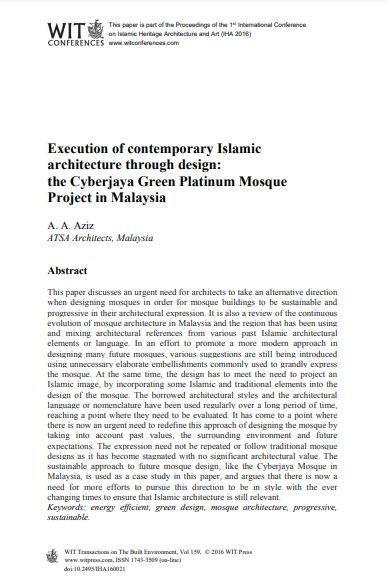
The approach taken in designing the mosque, is to bring a mosque typology back to its roots as a community centre, humble in its outlook but rich in its content.
The mosque takes subtle cues from earlier mosques of the region with high sensitivity to the local climate and weather including Kampung Laut Mosque and Lebuh Acheh Mosque.
To create a spiritual building on all levels; developed through careful study of place and programs, the pragmatics of rituals and practices, considerations of materials and traditional skills, and its relation to people.
The Cyberjaya 10 Mosque is designed as a centre of excellence, a one stop centre to learn, live and rehabilitate one’s soul. It’s facilities include an expansive ground acting as a green buffer and park, dialysis centre, multipurpose room to be used for tuitions and events, open courtyard for informal gatherings and a tranquil and discreet jenazah managing room and garden.
The proposal work towards a wholesome community intervention, not just a mosque, integrating both communal and social needs in an effort to uplift and engage a township The mosque acts as a hub and an example to propagate and educate on sustainable and healthy living choices; cycling & community farming.
It is clear that the design of the mosque is inspired by the traditional Malayan architecture. In particular, its design language, vocabulary, and syntax are similar to the architecture of the Kampung Laut Mosque in Kelantan, the oldest surviving mosque in Malaysia, believed to date back to the 18th century. This similarity is widely noted in the design of the roof of the prayer hall, in addition to the shape of the external entrances. The outer area of the mosque consists of wide, covered passages, a traditional verandah (serambi) and several courtyards, all leading to the massive main prayer hall which is preceded, at the entrance court, by a rammed-earth minbar wall. The scattered courtyards are used for community events, while the main courtyard is used as an extension to the inner prayer hall.
The interior space of the mosque is characterized by the dominance of its steel frame structure of white columns supporting the intersecting beams that carry the roof. The three-tiered steel frame roof rests on four columns (four-column prayer halls being a common pattern in mosques), giving the interior space a sense of spaciousness and visual continuity in the Qibla wall direction. Structural ‘honesty’ can be considered here as a tendency that changes what we’re accustomed to seeing in a traditional mosque, which is typically crowded with decorative formations that make the structural elements take a rather secondary role from a visual
point of view.
The essence of the building lies in the relationship between the boundaries of man-made and god-made, it requires coming to terms with the presence of environment and the materials through the succession of seasons and years. As such, materials are kept as close as possible to its natural state, timber, concrete and stone. In line with its humble façade, the mosque plans to keep energy consumption at a minimal. The usage of fans and natural ventilation in all of its spaces are maximized, the water feature acts as both storm management and rain water harvesting for grey water usage. Daylighting is maximized by direct openings to the side and clerestory windows on the tiered roof.
Disclaimer : Mopsqpedia is a non-profit database. All images featured in the database are sourced from various references, publications, and websites related to mosque architecture. Mosqpedia does not claim ownership of any images unless explicitly stated. Images are provided solely for educational and bibliographic purposes. Mosqpedia disclaims any responsibility for copyright infringements related to the images displayed. Users are responsible for verifying copyright status and obtaining permission from original sources if they intend to reproduce, distribute, or use any image beyond fair use.
I agree to the terms outlined below:
You agree to upload and assign Mosqpedia Database the rights to use the content worldwide and in perpetuity across all current and future media platforms. Mosqpedia Database may edit, copy, adapt and translate your contribution.
The content will be distributed under the Creative Commons Attribution-Deed – Attribution-NonCommercial-NoDerivatives 4.0 International – Creative Commons
All data will be stored in line with data protection regulations.
I agree to the terms outlined below:
You agree to upload and assign Mosqpedia Database the rights to use the content worldwide and in perpetuity across all current and future media platforms. Mosqpedia Database may edit, copy, adapt and translate your contribution.
The content will be distributed under the Creative Commons Attribution-Deed – Attribution-NonCommercial-NoDerivatives 4.0 International – Creative Commons
All data will be stored in line with data protection regulations.